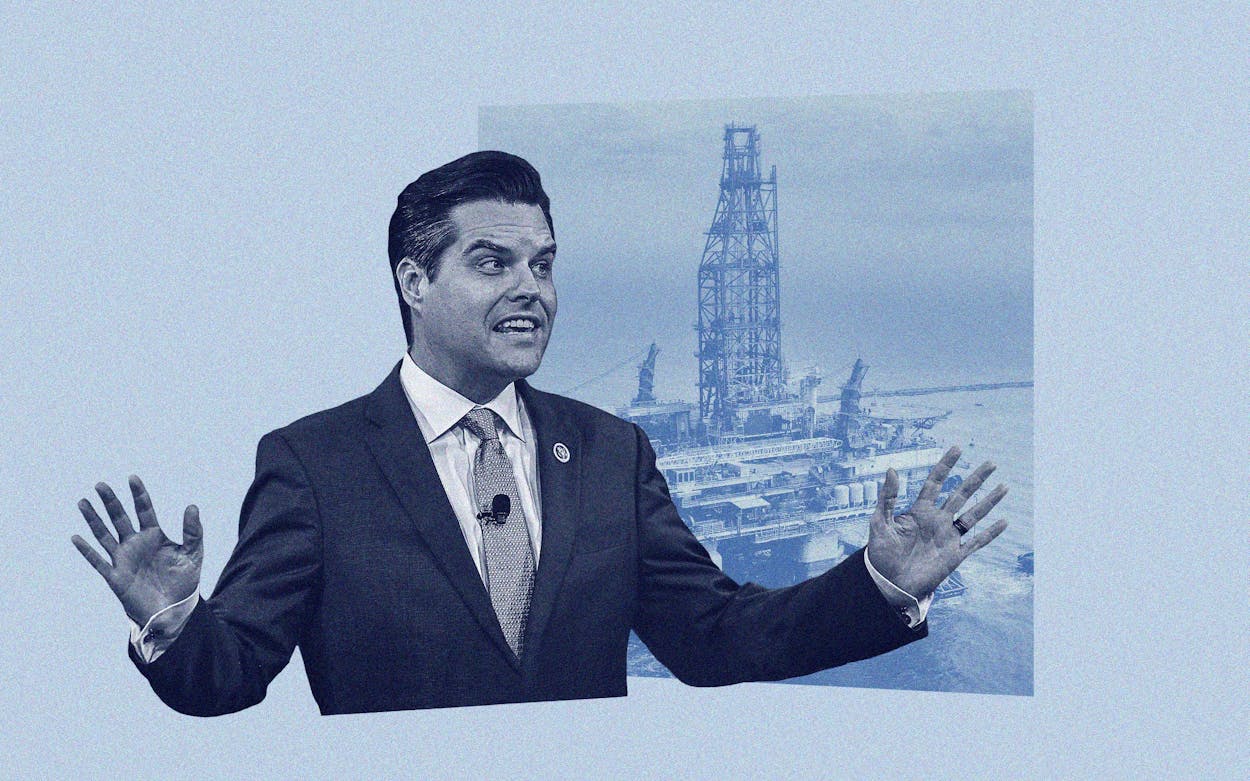Say this for Texas politicians in favor of the oil and gas industry: they aren’t hypocritical about it. Congressman Dan Crenshaw, for example, both believes in climate change and in expanding the use of fossil fuels, including via offshore energy exploration. He’s not alone in this; in 2021, some fellow House Republicans from Texas, including Lance Gooden, Ronny Jackson, and August Pfluger, coauthored legislation with Crenshaw to continue drilling on the Outer Continental Shelf in the Gulf of Mexico, right off the coast of their own home state. You can agree or disagree with their positions, but in either case, you gotta hand it to ’em—they’re consistent.
In Florida, meanwhile, those in the pro-oil contingent have an, er, more nuanced view of energy exploration. Broadly speaking, they’re for it—they’d just prefer that it happen somewhere else, please.
Last week, Congressman Matt Gaetz, who represents a district that includes portions of the Florida Gulf Coast, added an amendment to the House’s Strategic Production Response Act that would maintain a ban on offshore drilling in his home state. That’s an issue the Florida Republican has been passionate about during much of his tenure in the House, having advocated successfully for bans on offshore exploration since he entered office in 2017—but only when it affects Florida. Gaetz has voted against similar bans in Alaska’s Arctic National Wildlife Refuge and Colorado’s White River National Forest, where none of his constituents own waterfront property.
Gaetz has found a novel frame on which to hang his opposition to drilling in his own backyard, even as he supports drilling in other Americans’ backyards: it’s not that his constituents don’t want to risk a potential spill contaminating their pristine beaches (a subject that Gaetz, whose politically connected father served as chairman of an organization in charge of handing out tens of millions in federal dollars to clean up the Deepwater Horizon spill, knows a bit about). His fellow Floridians may talk about it in those terms, but Gaetz has insisted throughout his congressional career that his position is free and clear of hypocrisy: he’s not just defending his own beaches because he thinks they’re too beautiful to risk (though in introducing the amendment, he did note that “offshore drilling is broadly opposed by coastal communities in these areas”). No, it’s because he’s a patriot who is following the guidance of the Pentagon.
Why does the Pentagon care about drilling off the Gulf Coast of Florida? Because the Gulf Test Range is there, and it’s host to various weapons-testing operations, and the Air Force would prefer not to have to deal with oil rigs or offshore wind turbines (which don’t present a contamination risk, but which make cool, Top Gun: Maverick–style dogfights more dangerous, and which can be an eyesore for beachgoers). Is the Gulf Test Range the only such facility in the U.S.? Hardly. There are seventeen (though Florida’s is the only one over water).
Nonetheless, the test range provides a handy excuse to Florida Republicans who would prefer a bit of cover for their NIMBYism. Gaetz is hardly alone in that; last year, Senators Marco Rubio and Rick Scott and Congressman Michael Waltz (of Boynton Beach) issued a press release attacking the Biden administration’s proposal to strip the state’s coastline of its protection from energy exploration by touting both the Gulf Test Range and “Florida’s pristine environment” as reasons why.
This is all a clever bit of positioning, but it doesn’t hold up under much scrutiny. Does Gaetz’s performative patriotism know no bounds? Nope, it’s definitely bounded by his interest in keeping Florida’s coastline free of oil rigs and wind turbines. He was the lone GOP representative to vote against last year’s American Energy Independence from Russia Act, which would have expanded natural gas production and reauthorized construction of the Keystone XL pipeline while opening up the Gulf Coast to new oil and gas leases. Gaetz also says that defunding American military support to Ukraine should be the nation’s top priority—a position that Pentagon leaders definitely do not share.
Patriotic pursuits aside, Florida’s beautiful coastline—and the tourism industry that depends on it—just keeps coming up as a key reason why Florida’s beaches deserve protections. In 2018, Scott, then the state’s governor, personally lobbied then–Secretary of the Interior Ryan Zinke to exempt Florida from drilling—a pitch that was successful without mentioning the Air Force test range. “I support the governor’s position that Florida is unique and its coasts are heavily reliant on tourism as an economic driver,” Zinke said in a statement.
To which we say: Have you seen Galveston? Port Aransas? South Padre Island? They may not have quite the same dazzle as what you’ll find in Florida, but they’re not any less “unique” than the beaches of the Sunshine State. We might argue that they just have more character! And imagining any of those places without the draw of tourism is a grim exercise. (Californians have made similar arguments about their own coastline, which does not have the protections of a federal ban.) Nonetheless, Florida gets to enjoy its special status as a state full of politicians who love drilling for oil and strongly support the goals of American energy independence—as long as it happens somewhere else, preferably far away from them. Bless their hearts.
- More About:
- Politics & Policy
- Dan Crenshaw
- Galveston








